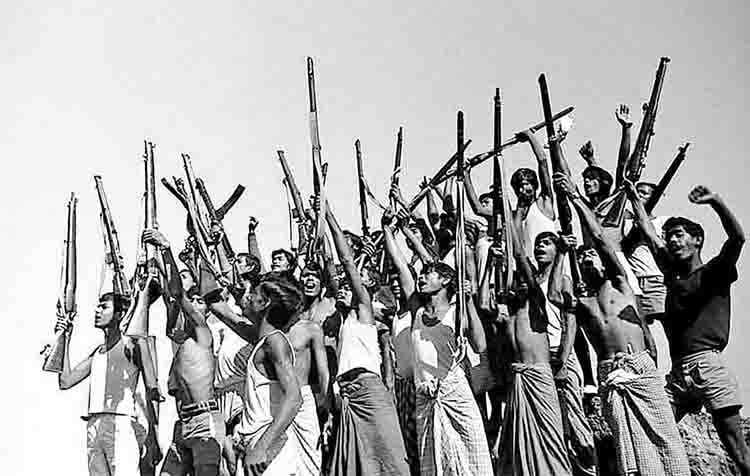
By Md Manikul Azad
DHAKA, Dec 15, 2024 (BSS) - The Liberation War of Bangladesh is an important chapter in the political and military history of the 20th century. It is a rare event to win a war against a trained force just in nine months.
In the great Liberation War, the fearless soldiers of the army, navy and air force spearheaded an irresistible attack on the Pakistani occupying forces on land, sea and air with the aim of freeing the motherland from the shackles of subjugation marching shoulder to shoulder with the freedom-loving people.
The revolts by the Bengali armed forces defying risks of being exposed
to firing squads, following the March 25, 1971 Pakistani crackdown set the course of the Liberation War and eventually earning the victory.
The Liberation War initially commenced in the form of resistance movement as the Pakistan Army cracked down on March 25, 1971 in Dhaka and elsewhere of the then East Pakistan, now Bangladesh.
During the turbulent early months of 1971, people from all sections came out with whatever they had to protest against the occupiers.
But as the war broke out the Bengali officers and troops of the Pakistani Army played an important role that continued throughout the subsequent nine months.
Bengali members made visible their strong presence in the political landscape with the declaration of independence by the then East Bengal Regiment major Ziaur Rahman while they led the effective primary resistance and then played the pivotal role in forming Mukti Fouz, fixed the war strategies and spearheaded the counter attacks.
Recalling his memories about the role of Ziaur Rahman during the war, Col. (Retd.) Oli Ahmad Bir Bikram in an interview told the news agency recently that he was present beside then Major Ziaur Rahman when the latter proclaimed the independence of Bangladesh.
The Bangladesh Army started its journey on the night of March 25, 1971 when the Pakistan Army launched a crackdown on East Pakistan, sparking a widespread resistance movement among Bengali civilians and military personnel.
The uprising was not just a reactionary act but a strategic war for independence.
Initially, the resistance was spearheaded by Bengali military personnel from units such as the East Bengal Regiment (EBR) and East Pakistan Rifles (EPR), who defected from the Pakistani forces, leading to the formation of the Mukti Bahini.
The Mukti Bahini, comprising the defected Bengali soldiers, police forces, and civilians, became the primary fighting force against the Pakistani occupation. Their involvement was crucial as they not only engaged in guerrilla warfare but also established a de facto government-in-exile that provided political legitimacy to the liberation struggle.
The formation of the Mukti Bahini on April 4, 1971, marked a turning point. Under the leadership of retired Colonel M.A.G. Osmani, the Mukti Bahini was divided into 11 sectors, each with a designated commander responsible for organizing regional resistance against the Pakistani military.
The strategic decision to create these sectors facilitated better coordination and allowed the guerrilla forces to employ the "Teliapara Strategy" - a plan that relied heavily on guerrilla tactics to disrupt Pakistani logistics and immobilize their forces through hit-and-run attacks.
The army's role expanded further with the establishment of independent brigades such as Z-Force, S-Force, and K-Force.
These brigades were specially trained and equipped to engage in frontal assaults against the Pakistani military, complementing the guerrilla operations of the Mukti Bahini.
Major figures like Major Ziaur Rahman, Major Khaled Mosharraf and Major Shafiullah were instrumental in leading these brigades to victories in several key battles, including those in Kamalpur, Sylhet and Belonia.
Their efforts demonstrated the effectiveness of a combined strategy of guerrilla warfare and conventional military engagements.
The leadership role played by the Bangladesh Army in the Liberation War was not merely a military endeavour but also a political one.
The presence of a clear military command under Osmani and sector commanders facilitated the organization of a government-in-exile, which was formally declared in Meherpur on April 17, 1971.
This government-in-exile provided a unified political front, essential for garnering international support and legitimizing the war of independence.
The Liberation War was a peoples' war but it was largely centred on the Bangladesh army's role in resisting and eventually defeating the Pakistani military.
The army's involvement ensured a coordinated fight against the Pakistani military, uniting disparate groups into a single, organized force - the Mukti Bahini.
Bangladesh navy, meanwhile, played an important and glorious role in the war emerging as part of the Bangladesh Armed Forces, initially only with 49 sailors.
These sailors risked their lives and engaged in frontline and guerrilla warfare against the enemy. In addition, the silent diving team conducted devastating attacks on seaports which is recorded in military history as 'Operation Jackpot'.
At the onset of the war 35 air force officers and cadets and 500 airmen defected to the Pakistani side and took part in the war and towards the end of 1971, the newly forced air force launched the famous 'Operation Kilo Flight' incurring significant damage to the enemy installations.
The Bangladesh Army, Navy and Air Force jointly launched an attack against the Pakistani forces on November 21, 1971. Since then, Armed Forces Day is being celebrated on November 21.
In recognition of their heroic contribution to the great Liberation War, seven members of the Bangladesh Armed Forces were awarded with the highest gallantry award "Bir Shrestha".
Besides, 58 armed forces members were awarded with the Bir Uttam, 134 awarded with the Bir Bikram and 178 members were awarded with the Bir Pratik title.
This synergy not only led to the military victory on December 16, 1971, but also the birth of an independent Bangladesh, solidifying the armed forces role as a crucial defender and builder of the nation's sovereignty.